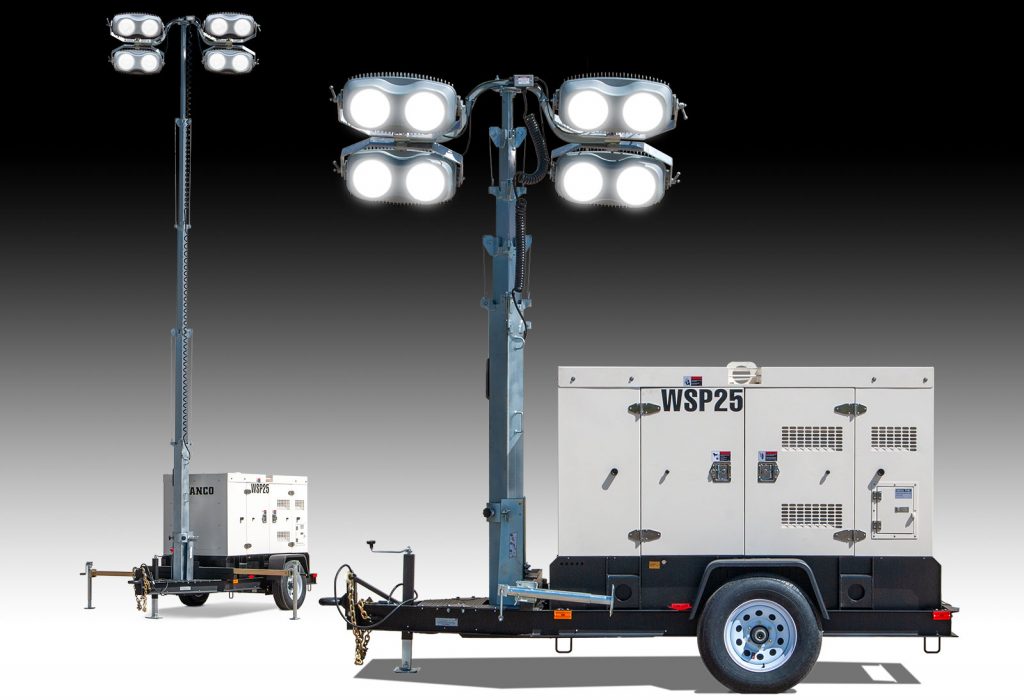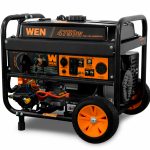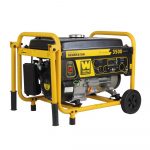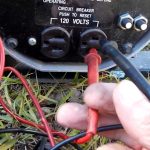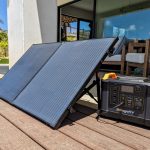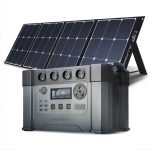A portable light generator is a great solution for those in need of a reliable light source. It can easily be moved from place to place and provide a reliable light source. One great thing about portable light generators is that they can be used to run LED lights. LED lights are becoming increasingly popular due to their energy efficiency and long life. LED lights are becoming the go-to light source for many households and businesses.
By running LED lights on your portable light generator, you can enjoy the same benefits as everyone else while being able to move the generator around. This makes it a great choice for anyone who needs a light source that can be taken with them wherever they go. Whether you’re camping or working outdoors, a portable light generator with LED lights can provide you with a reliable and energy-efficient light source.
What should you not do with a generator?
It is important to remember that a portable light generator should not be used in certain situations. First of all, never use a portable light generator in wet or damp conditions. It is a fire hazard and can be dangerous to your own safety. Secondly, never run a portable light generator in enclosed spaces, such as a basement, garage, or shed. Generators produce exhaust fumes that can be toxic and cause serious health problems if inhaled.
Thirdly, never overload a portable light generator by plugging in too many electrical items. This can cause the generator to overheat and become damaged. Fourthly, always make sure that the portable light generator is switched off and unplugged when not in use. This will help prevent any electrical accidents from occurring. Finally, never leave a portable light generator running unattended. This can be a fire hazard, and can cause serious damage to property and injury to people nearby.
Why do lights flicker with generator?
Portable light generators are used in places where access to electricity is limited or nonexistent. They produce power to light up a room, but users may have noticed that sometimes the lights will flicker or dim. This is a common issue that can have a few different causes. The most likely cause is that the generator is not powerful enough to supply the amount of electricity needed to keep the lights at a constant level of brightness. This can happen if the generator is too small or if too many items are connected to it at once.
Another possible cause is that the generator is malfunctioning. This can occur if the generator is old or has been damaged. If this is the case, it may be necessary to replace the generator to get the lights working properly again. Another common cause of light flickering is an issue with the connections. If the connections between the generator and the lightbulbs are loose or damaged, this can cause the lights to flicker. The connections should be checked to make sure they are secure. Finally, it could be that the lights themselves are the problem. If the bulbs are old or of a low quality, they will not be able to handle the power provided by the generator and will flicker as a result. To rectify flickering lights, it is important to first identify the source of the issue. By determining the root cause of the problem, you can take the necessary steps to ensure that your lights stay lit and bright.
Can a generator turn lights on?
Portable light generators are a great way to turn on lights in remote or off-grid locations. These generators are powered by small, fuel-efficient engines and are capable of providing power to a range of different light sources. With a portable light generator, you can be sure that your lights will be on whenever you need them. The generator is easy to operate and requires little maintenance. All you need to do is fill the fuel tank and you’ll be ready to start producing energy.
The generator will then turn on the lights and you’ll be able to see in the dark. When you’re finished using the generator, you can simply turn it off and store it away until you need it again. This makes it an ideal option for those who need to be able to turn on the lights quickly and easily. Overall, a portable light generator is a great choice for anyone in need of a reliable source of light. With it, you can ensure that your lights are on when you need them, with minimal effort and maintenance required.
Is it OK to run generator all night?
It is generally not recommended to run a portable light generator all night. This type of generator is typically used for short-term lighting and power needs. While it may be technically possible to use a portable light generator for extended periods of time, doing so is unsafe and can cause damage to the generator and the surrounding environment. When running a portable light generator for extended periods of time, the fuel supply could run out and cause the generator to shut down. This could lead to an unsafe environment, as the lights will no longer be operating.
Additionally, the generator can overheat from running all night, which can cause the generator to become damaged and lead to a short life span. In addition, running a generator all night can also be quite noisy, which can be disruptive to neighbors. It is also important to note that most generators produce emissions that can be hazardous to one’s health. It is best to avoid running a portable light generator for extended periods of time to reduce the risk of potential hazards. Overall, it is not recommended to run a portable light generator all night. If you need extended lighting and power needs, it is best to use a larger and more powerful generator that is designed for such use. It is also important to follow all safety measures when operating a generator to ensure the safety of yourself and others.
What are generator lights?
Generator lights are portable lights that are powered by generators. They provide a powerful and reliable light source wherever you may need them. Generator lights are great for outdoor events, camping, or just to have an extra light source when needed. They come in several sizes and power outputs, so you can get the right light for any situation. Generator lights provide a much brighter light than any normal battery powered light, and are much more reliable as well.
They are powered by a generator, meaning you don’t have to worry about battery life. Generator lights are also much sturdier than battery powered lights, so they can withstand wear and tear better. Generator lights are great when you need a reliable light source on the go, or when you are in a remote location. They are also great for emergency situations, as they provide a powerful and reliable light source. Generator lights can also be used to light up large areas, such as a campground or festival. Overall, generator lights are a great source of lighting for any situation. They are reliable, powerful, and easy to use. With the right generator, generator lights can provide you with powerful light whenever and wherever you need it.
What is the lightest generator?
Portable light generators are small, lightweight machines that can provide light on the go. They are popular with campers, adventurers, and in military and emergency settings. The lightest generator is a lightweight and compact unit that is small enough to fit in a suitcase or backpack. It is designed to be easy to transport and carry, and the lightest models weigh less than five pounds. These generators are powered by gas or battery, and are capable of providing up to a few hours of light.
They are also designed to be quiet and low-maintenance. The lightest generators are ideal for people who need a quick and easy way to provide light in an emergency. They are compact enough to store in a car, and can be used anywhere with access to a power source. Lightweight generators are becoming increasingly popular, as they provide a convenient way to get light on the go. They are becoming an essential tool for adventurers and those in need of reliable illumination in remote or difficult terrain.
What is the cheapest quietest generator?
If you’re looking for a quiet, affordable option, the cheapest quietest generator is a great choice. This type of generator is designed to run quietly, and it is significantly less expensive than many other models on the market. It is a great option for those who need a compact, lightweight generator that can be easily transported. The quiet operation also makes it ideal for outdoor activities, camping trips, and other adventures. Many models also come with up to a three-year warranty, giving you peace ofmind when it comes to reliability.
The cheapest quietest generator is also easy to operate and maintain. Most models come with clear instruction manuals and easy-to-follow maintenance guidelines. This makes it simple to get up and running quickly, and to keep your generator running smoothly for as long as possible. When searching for the cheapest quietest generator, it is important to consider the size and power output you need. Make sure to choose a model that fits your specific needs. There are many different types of generators on the market, so you are sure to find the one that is right for you. Overall, a portable light generator is a great tool to have on hand. And with the cheapest quietest generator, you can enjoy reliable and quiet power on the go. With the right model, you can be sure to get the power you need in an affordable and efficient package.
How many watt generator do I need to run a small house?
If you are looking to power a small house with a portable light generator, it is important to understand the wattage requirements. Generally speaking, a generator with a minimum of 5,000 watts will be necessary to power a house. This can be broken down into a minimum of 2,000 watts for basic appliances and 3,000 for heating and cooling systems. However, it is important to note that the size of your generator will depend on the size of your house and the number of appliances and electronics you need to power. A larger house will require a generator with more wattage and a smaller house will require less wattage.
In addition, you should also consider any additional electrical systems such as backup generators and solar panels. These will require a generator with a greater wattage if you want to be able to power them. It is also important to note that the wattage required to power a small house will also vary depending on the type of appliances installed. Large appliances such as washers, dryers and refrigerators may require a generator with a higher wattage than smaller appliances such as TVs and computers. Finally, you should also consider the efficiency of your generator. If you are choosing a generator with a lower wattage, it is important to make sure that it is efficient enough to power your home. A generator with a higher wattage will be able to power more appliances, but it may not be as efficient and may cost more to operate.
Can a light tower be used as a generator?
A light tower is an especially useful type of generator for these applications. It is an efficient way to produce bright light in a wide area, and can be used in outdoor or indoor locations. The portability of a light tower makes it ideal for many types of projects. It can be used to provide light for construction sites, outdoor events, or any other location where you need to generate light. The light tower is typically powered by a gas or diesel engine, so you don’t need to worry about running out of power when you’re working on a project.
A light tower can also be used as a generator. It can provide power for a variety of needs, such as powering small tools or lights for an outdoor event. With a generator, you won’t have to worry about running out of power in the middle of a project. Overall, a light tower is an incredibly versatile tool. It can be used to generate light or power, making it a great choice for a variety of applications. Whether you’re working on a construction site or setting up an outdoor event, a light tower is a great option for your portable light generator.
What can I use for power instead of a generator?
Using a portable light generator doesn’t have to be limited to a traditional generator. There are many alternative sources of power that you can use to power your portable light generator. For instance, energy from the sun can be harnessed with solar panels and used to provide energy for your generator. Solar panels are becoming increasingly popular due to their ability to store energy and provide a clean, renewable energy source. Wind power is also an option for powering your portable light generator.
Wind turbines can be used to generate electricity for your generator by harnessing the power of the wind. Batteries are also an option for powering your generator. They can be used to store the energy generated by solar panels, wind turbines, or other sources and then used to power your generator. Hydroelectricity is another alternative energy source that can be used to power your generator. This type of energy is generated by using the power of water to turn turbines and generate electricity. Ultimately, there are many alternative sources of power you can use to power your portable light generator. By exploring these options, you can find the best solution for your unique needs.
How many watts is a light tower generator?
The wattage of a light tower generator can vary depending on the type of generator and its power output. Generally, light tower generators range from 400 watts to 25,000 watts, depending on their size and purpose. When researching a light tower generator, it is important to consider the wattage you need. If you are looking for a generator to light a large area, such as a construction site or outdoor event, then you will likely need a generator with a higher wattage. On the other hand, if you are looking for a generator to light a smaller area, such as a campsite, then a lower wattage generator should suffice. In conclusion, the wattage of a light tower generator can vary depending on its purpose and size. Generally, light tower generators range from 400 watts to 25,000 watts, and it is important to consider the wattage needed when researching a generator.
What size generator do I need to run a light?
Choosing the right size generator to run a light can be a tricky task. If you are looking for a portable light generator, you need to consider the wattage of the generator you will require. A generator with a wattage rating of at least 1,000 watts should be sufficient to power a light. You might also need to take into account the additional wattage of other appliances you want to power with the generator. For example, if you want to use the generator to power a laptop and light at the same time, you should consider buying a generator with a higher wattage rating.
Generally, a generator with a wattage rating of 5,000 watts or more should be enough to power multiple appliances. When it comes to portability, it is important to consider the weight and size of the generator. A lighter generator is usually more portable, but you may need to sacrifice some power for the weight. You should also consider the noise level of the generator. Look for a generator that is quieter and has a low decibel rating. Overall, selecting the right size generator to run a light depends on your needs and budget. If you are looking for a powerful, portable light generator, choose a generator with a wattage rating of at least 1,000 watts. If you want to power multiple appliances, you should opt for a generator with a wattage rating of 5,000 watts or more. Be sure to consider the weight, size and noise level of the generator to ensure optimal portability.
What size generator do I need to run Christmas lights?
If you’re looking for a portable generator to power your Christmas lights, the size of the generator you need will depend on the amount of power your lights require. For small Christmas displays, a smaller generator with a wattage of 1000-2000 watts should be sufficient. If you’re looking to power more powerful lights, such as those used in larger holiday displays, you may need a generator with a wattage of 3000-4000 watts. When selecting a generator, it’s important to make sure it has the right type of outlets for your lights. Some generators may only offer AC outlets, while others may offer DC power outlets as well. When using a generator to power Christmas lights, it’s important to follow all safety guidelines, including keeping the generator outside and away from windows, doors, and vents. It’s also important to keep it away from any combustible materials, as generators can produce carbon monoxide.
How many major systems are on a light tower?
These systems include the source of light, the tower, the generator, and the fuel supply. The source of light is typically some form of halogen or xenon bulbs, with halogen bulbs being the most common. These bulbs provide a powerful, bright light that is perfect for outdoor use. The tower provides the structure and support for the source of light and the generator. It is typically made of aluminum or fiberglass and is adjustable to different heights.
The generator is the power source for the system. It is usually gas or diesel powered and is capable of providing the necessary power for the light. It is important to choose the correct size generator for your particular light tower. The fuel supply is necessary to keep the generator running. Depending on the size and type of generator, the fuel supply can be propane, diesel, gasoline, or a combination of all three. In total, there are four major systems on a light tower – the source of light, the tower, the generator, and the fuel supply. By understanding the different systems and their purpose, you can make sure your light tower is working correctly and providing the light you need.
How long will a light tower run?
Light towers are an important component of these generators. Knowing how long a light tower will run is essential when deciding which portable generator to purchase. A light tower’s run time depends on the capacity of its generator. the type of fuel being used and the frequency of use. Generally, a light tower will run for around 150-200 hours on one tank of fuel, depending on the size of its tank and the type of fuel.
Most light towers also come with a fuel tank gauge, allowing you to easily check your generator’s fuel levels. This allows you to plan ahead and refuel before the tower runs out of fuel. A good quality generator should also have an automatic shutoff feature, which will shut off the generator once the fuel levels reach a certain point. In order to get the longest possible run time from your light tower, it is important to maintain its regular checkups. This includes checking the oil levels, changing the oil regularly, and cleaning the filters. It is also important to use the right type of fuel for the generator, as the wrong fuel can lead to poor performance and reduced run times. By following these tips, you can ensure that your light tower will run efficiently and reliably for as long as possible. With proper maintenance and care, you can get many years of use out of your portable light generator.
How high do light towers go?
Portable light generators are an invaluable tool for illuminating dark areas. They come in the form of light towers, which are tall, slim and often moveable structures. The height of a light tower can vary depending on the purpose of the generator. For industrial or commercial purposes, a light tower may reach heights of up to 40 to 60 feet. If a higher output is needed, then light towers can reach up to 80 or even 100 feet.
For large-scale events, such as music festivals and carnivals, light towers are even higher. These types of towers are typically between 130 and 160 feet tall, allowing the light to spread out further and cover large areas. Towers of this height can also be used in other situations, such as lighting up entire construction sites. By having a light tower of that height, the area of illumination can increase up to 20 times more than lower height towers. In conclusion, light towers can reach up to 160 feet high, depending on the purpose for the generator. This allows light to spread out further, creating more efficient and effective illumination.
How much power does a portable generator have?
It’s a great option for camping, RVing, and other outdoor activities. Portable light generators can provide enough power to light up a small area, power appliances, and even run a small air conditioner. The amount of power generated by a portable light generator depends on the size and model you purchase. Smaller units can generate up to 1000 watts of power, while larger units can generate up to 5000 watts. This is enough power to light up an outdoor area or power a small appliance.
Portable light generators are also great for backup power in case of an emergency. They are small and lightweight, so you can easily take them with you when you travel. They are also more affordable than larger, stationary generators. When using a portable light generator, it is important to make sure you use the right type of fuel in the generator. This will ensure that it is safe and efficient. Gasoline and diesel generators should be used with gasoline, while propane generators should be used with propane. Overall, portable light generators are a great way to get access to reliable power when you need it. They are small and lightweight, and can provide enough power to light up a small area and power small appliances. The amount of power a portable light generator can provide depends on the size and model of the generator you purchase.
What is the best portable generator for storms and outdoors?
With the right generator, you can have the lights and power you need for camping, events, and other activities. When choosing the best portable generator for storms and outdoors, it’s important to consider both your budget and your needs. Smaller and more affordable generators are great for camping trips and other short-term needs, while more expensive, full-featured models are better for larger projects and long-term use. The best portable generator should be lightweight, easy to transport, and efficient. Many generators come with features such as fuel-efficient engines, multiple outlets, and inverters, which can be useful when you need to power sensitive electronics.
Noise is an important factor to consider when choosing a generator for outdoor use. Look for models that have quieter engines, so you don’t have to worry about disturbing the neighbors or wildlife. Finally, safety should be a priority when selecting a generator. Look for models that have safety features such as automatic shut-off, overload protection, and spark arrestors. With the right generator, you can be sure you’ll have the lights and power you need when you need it most.
What appliances can be plugged into a portable generator?
With a portable generator, you can plug in a variety of different appliances to give you the power you need. This could include things like laptops, cell phone chargers, and even small kitchen appliances like blenders and mixers. If you need a bit more power, you might be able to plug in power tools like a drill or a circular saw. In addition to these more common items, you can also get a portable generator that can power larger appliances, like a refrigerator or a freezer. This is a great way to keep your food cold or frozen even when you’re out camping or on a road trip.
If you’re looking for a generator that can power a variety of items, you may want to look into one that is set up with a 110-volt outlet. This type of outlet is compatible with most modern electronics and can make it easier to find the right appliance to plug in. Finally, make sure that you check the wattage requirements for each of the items you plan to plug into your portable light generator. Knowing the wattage requirements can help you ensure that you don’t overload your generator and that you get the power you need from the generator.
What are the benefits of using a portable generator for home backup?
A portable light generator can be an excellent addition to your home backup system. This type of device is designed to provide a reliable source of electricity in the event of a power failure. It can help keep vital systems, such as your heating, cooling and security systems, running during an outage. Not only is a portable light generator more affordable than a traditional whole-house generator, it can also be easier to maintain and operate. It is compact enough to be stored in a closet or basement and quickly plugged into an outlet to get your family up and running again after a power interruption.
In addition to providing your home with much-needed power during an outage, a portable light generator can also be used to power tools, appliances and other devices when camping or in remote locations. This type of generator is also great for powering entertainment systems or charging your devices during an outdoor event. A portable light generator is an invaluable tool for homeowners looking to keep their home running during an outage. Not only is it affordable and easy to maintain, but it can also be used to power a variety of devices when away from home. Furthermore, its portability makes it easy to transport and store in the event of an emergency.
